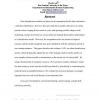Free Online Productivity Tools
i2Speak
i2Symbol
i2OCR
iTex2Img
iWeb2Print
iWeb2Shot
i2Type
iPdf2Split
iPdf2Merge
i2Bopomofo
i2Arabic
i2Style
i2Image
i2PDF
iLatex2Rtf
Sci2ools
119
click to vote
IDA
2002
Springer
2002
Springer
Online classification of nonstationary data streams
Most classification methods are based on the assumption that the data conforms to a stationary distribution. However, the real-world data is usually collected over certain periods of time, ranging from seconds to years, and ignoring possible changes in the underlying concept, also known as concept drift, may degrade the predictive performance of a classification model. Moreover, the computation time, the amount of required memory, and the model complexity may grow indefinitely with the continuous arrival of new training instances. This paper describes and evaluates OLIN, an online classification system, which dynamically adjusts the size of the training window and the number of new examples between model re-constructions to the current rate of concept drift. By using a fixed amount of computer resources, OLIN produces models, which have nearly the same accuracy as the ones that would be produced by periodically re-constructing the model from all accumulated instances. We evaluate the ...
Related Content
| Added | 19 Dec 2010 |
| Updated | 19 Dec 2010 |
| Type | Journal |
| Year | 2002 |
| Where | IDA |
| Authors | Mark Last |
Comments (0)

